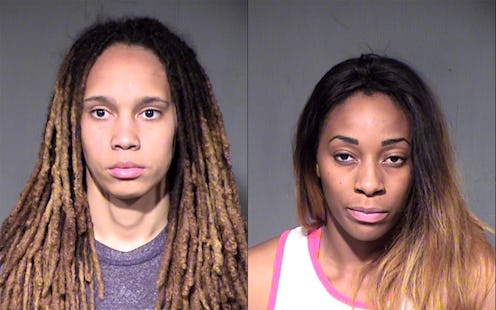News
What These WNBA Stars' Suspensions Say

The Women's National Basketball Association suspended players Brittney Griner and Glory Johnson for seven games each on Friday, following their domestic violence arrests last month. The couple married earlier this month but faced disorderly conduct charges after an alleged altercation with each other in April. This suspension is the longest ban in the league's history, according to the Associated Press. Griner's attorney, David Michael Cantor, said in a statement in April, "Glory and Brittney sincerely apologize for the distraction this has caused their families, respective teams, the WNBA, sponsors, and fans."
WNBA President Laurel Richie released a statement Friday on the gravity of the situation, stating, "The WNBA takes all acts of violence extremely seriously. It is our strong belief that violence has absolutely no place in society, in sports or in this league." The WNBA launched its own investigation of the alleged incident, and Richie consulted with NBA Commissioner Adam Silver and NBA President for Social Responsibility and Player Programs Kathy Behrens on the best course of action. The WNBA is requiring both players to undergo counseling and says it might revisit the matter if they do not comply.
In a year that has seen a number of scandals in professional sports, officials have a harder time ignoring issues of domestic violence. However, the WNBA's seven-game ban stands in stark contrast with other punishments doled out in men's leagues, asking the question of whether the cause is progress or gentler treatment toward male athletes, many of whom have still been allowed to continue playing despite domestic violence allegations.
Recent domestic violence cases among male athletes have left an embarrassing trail on the leagues' reputations. The National Football League's treatment of the Ray Rice case angered fans and activists alike. Rice originally received a two-game suspension and then was suspended indefinitely after details of him hitting his then-fiancée in an elevator were release. He then filed and settled a wrongful termination suit for $1.588 million. Rice later apologized for his "horrible mistake" to fans and the city of Baltimore.
Although Rice is the most obvious recent example, male athletes accused of domestic abuse often receive punishment much less harsh than Griner and Johnson's suspensions. Indiana Pacers' Lance Stephenson was accused of allegedly pushing his pregnant girlfriend down a flight of stairs and slamming her head into a step but never faced discipline from the NBA. Stephenson's attorney said his client, "did not maliciously, intentionally or in any other way cause harm to Jasmine Williams." Jeff Taylor of the Charlotte Hornets was charged last year with domestic assault, which prompted Commissioner Silver to say the NBA would "take a fresh look" at the league's punishments and procedures for domestic violence. Taylor later apologized for his actions. Taylor's eventual suspension was the first for domestic violence in the NBA since Ron Artest's in 2007, according to Bleacher Report. Artest allegedly pushed a woman to the floor and prevented her from from calling 911. He apologized and returned to the Sacramento Kings.
There are fewer examples of female domestic violence cases in the athletic world. The only other notable example is Hope Solo, the U.S. Women's Soccer goalkeeper accused of violence toward her nephew and half-sister. The charges were dropped, and Solo said she was defending herself from her 17-year-old nephew, so she received no disciplinary action from the league. She denied the charges.
Female domestic violence cases in sports seem to follow a different pattern than men's. Griner and Johnson's situation got a speedier and more transparent punishment. Griner is required to take a 26-week domestic violence course, and Johnson's case is pending. Richie says that training and education are as important as punishment, and the WNBA will continue to educate its players and team personnel on this issue. Although situations like theirs are uncommon in women's professional sports, the treatment of this case reflects a sincerity regarding domestic violence that is not always present in men's athletics.
Image: Maricopa County Sheriff’s Office (2); Getty Images (1)